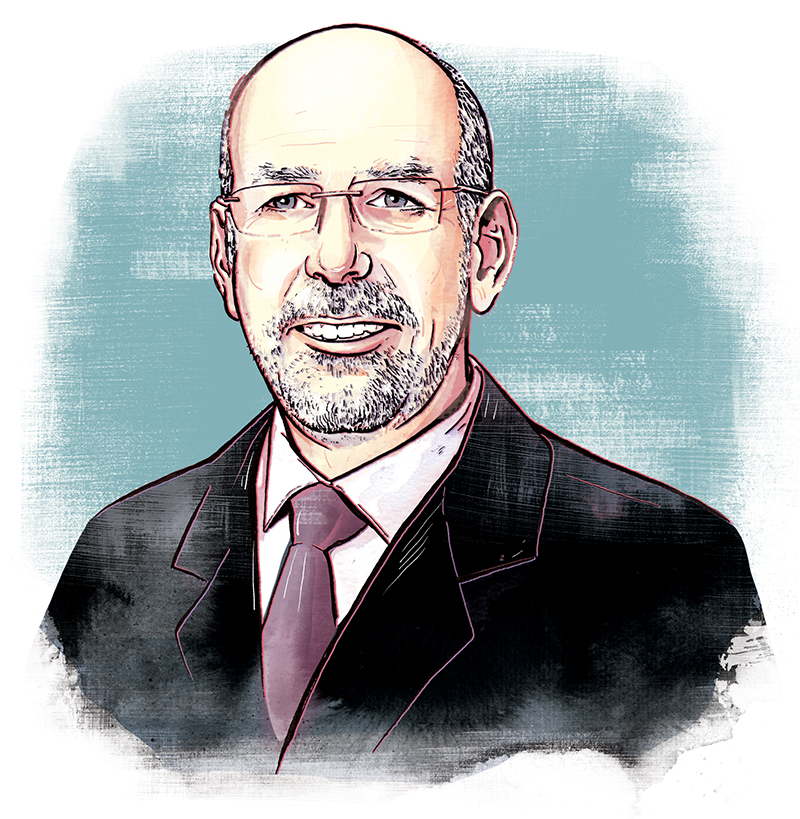
Dr. Michael Lutz has safeguarded men’s health in metro Detroit since 1986. After recovering from a serious illness during his first year of medical school, Lutz decided that no one should have to endure a preventable, life-altering sickness. As a urology specialist focusing on screening, early detection, and treatment of prostate cancer, Lutz has been instrumental in men’s health education. He was a founding member of the first Us Too Prostate Cancer support group, served as co-chair of the Prostate Cancer Task Force for the American Cancer Society, and served on the Prostate Conditions Education Council. He is currently an assistant professor at Oakland University’s William Beaumont School of Medicine and partner at the Michigan Institute of Urology.
In 2009, he founded the MIU Men’s Health Foundation, a nonprofit dedicated to men’s health advocacy and survivorship. The foundation’s annual Men’s Health Event, which takes place late September at Ford Field, offers attendees free health examinations valued at $2,000. From these events, Lutz and his team have sourced vital, life-saving data about the state of male wellness in our underserved community. Here, he discusses why men’s health education plays a key role in Detroit’s continued development.
Give: What inspired you to start MIU Men’s Health Foundation?
Michael Lutz: We always try to do our best as physicians to care for patients, but oftentimes you want to do more — you want to do something that changes the community at large. The foundation allows us to change the way people perceive their health. You can actually see your ability to move the needle in the community.
Why do men, in particular, need more support and education about their health?
When we held our first Men’s Health Event, one of the things that became evident was a perception, by the organizations we worked with, that men didn’t care about their health. We quickly learned this was a misconception: 400 men were standing outside the door at 9 a.m. waiting to get in. Men do care about their health; they just don’t know where to begin. Boys aren’t taught about the importance of health care, and once they leave their mothers at around 18 years old, they are lost to the health care industry. There are very few organizations right now that actually address the underserved male community and recognize the need for men to be engaged in their health and well-being. Our foundation fills this unmet need.
What health issues are men in Detroit facing today?
At the annual Men’s Health Event, we screen over 1,000 men, perform up to 15,000 screenings, and see up to 7,000 attendees. The data we’ve collected shows almost 85% of our underserved male community is overweight or obese. Seventy-five percent of men are associated with hypertension. We also see significant levels of anxiety and depression in over 30% of attendees. I am certain that many of them are not having their health addressed. Through our advocacy, we hope to communicate that preventative health care is not a sign of weakness but a sign of strength.
How has the Detroit health community engaged with and supported your mission?
We’re very fortunate to have a lot of good health partners. The Men’s Health Event requires over 200 volunteers to be successful. University of Detroit Mercy School of Dentistry has performed oral cancer screenings and has detected underlying abnormalities in approximately 10% of individuals. Detroit Central City Integrated Health has been one of our main partners for mental health screening. Wayne State University brings their entire class of 50 physician assistants to the event. It’s a great learning tool for them to see how you can treat a community versus treating patient by patient.
Do you have any up-and-coming initiatives that you can share?
Fall is our off-season. It’s when we do the important work of analyzing the data we collected. But, in December, our Prostate Cancer Survivorship Series will be held at Meadowbrook Hall.
How does men’s health advocacy and education contribute to the Detroit community as a whole?
I see this being part of Detroit’s revitalization. When you feel healthy and feel good, you want to be more involved and engaged in other activities. So, when you consider events like Slow Roll, mobility programs like the scooters and bicycles, and the opening of more parks and greenways in the city, healthy people are going to continue to expand those and they’re going to be part of the revitalization and growth.
|
|
|











